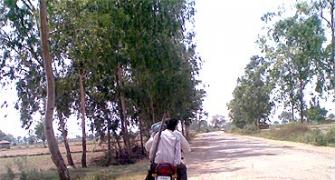 The government's acquisition of land for projects has been facing protests across the country, the violence in Uttar Pradesh being only the latest. As people's power collides with public projects, MR Madhavan explains what land acquisition is all about
The government's acquisition of land for projects has been facing protests across the country, the violence in Uttar Pradesh being only the latest. As people's power collides with public projects, MR Madhavan explains what land acquisition is all about
What is Land Acquisition?
Land acquisition is the process by which the government forcibly acquires private property for public purpose without the consent of the land-owner. It is thus different from a land purchase, in which the sale is made by a willing seller.
How is this process governed?
Land Acquisition is governed by the Land Acquisition Act, 1894. The government has to follow a process of declaring the land to be acquired, notify the interested persons, and acquire the land after paying due compensation. Various state legislatures have also passed Acts that detail various aspects of the acquisition process.
Land is a state subject. Why is Parliament passing a law?
Though land is a state subject, "acquisition and requisitioning of property" is in the concurrent list. Both Parliament and state legislatures can make laws on this subject.
Is there a new Act being proposed?
The government had introduced a Bill to amend this Act in 2007. That Bill lapsed in 2009 at the time of the general elections. The government has stated its intent to re-introduce a similar Bill, but has not yet done so.
What are the major changes being proposed?
There are significant changes proposed in the 2007 Bill with regard to (a) the purpose for which land may be acquired; (b) the amount of compensation to be paid; (c) the process of acquisition; (d) use of the land acquired; and (e) dispute settlement mechanisms. We explain these briefly below.
Purpose: Currently, land may be acquired for a range of uses such as village sites, town or rural planning, residential purposes for poor or displaced persons, planned development (education, housing, health, slum clearance), and for state corporations.
Land may also be acquired for use by private companies for the above purposes or if the work "is likely to prove useful to the public".
The 2007 Bill had a narrower list: (a) for strategic naval, military or air force purposes; (b) for public infrastructure projects; and (c) for any purpose useful to the general public if 70% of the land has been purchased from willing sellers through the free market.
Compensation: The current Act requires market value to be paid for the land and any other property on it (buildings, trees, irrigation work etc) as well as expenses for compelling the person change place of residence or business. It explicitly prohibits taking into account the intended use of land while computing market value. The 2007 Bill requires payment of the highest of three items: the minimum value specified for stamp duty, the average of the top 50 per cent by price of land sale in the vicinity, and the average of the top 50 pc of the land purchased for the project from willing sellers. For computing recent land sale, the intended land use is to be used. Thus, agricultural land being acquired for an industrial project will be paid the price of industrial land.
Process of acquisition: Several changes are proposed, including the requirement of a social impact assessment. Any project that displaces more than 400 families (200 in hilly, tribal and desert areas) will require an SIA before the acquisition is approved.
Use of land acquired: The 2007 Bill requires the land acquired to be used for that purpose within five years. If this condition is not met, the land reverts to the government (it is not returned to the original land owners). If any acquired land is transferred to another entity, 80 pc of the capital gains has to be shared with the original land-owners and their legal heirs.
Dispute Settlement: Currently, all disputes are resolved by civil courts, which results in delays. The 2007 Bill sets up Land Acquisition Compensation Dispute Resolution Authority at the state and national levels. These authorities will have the power of civil courts, and will adjudicate disputes related to compensation claims.
Does the proposed Bill address the major issues?
The Bill narrows the uses for which land may be acquired. It also changes the compensation due and links that to the market price for which land is to be used.
There could be significant changes in acquisition for use by private industry. Firstly, they would have to purchase at least 70 pc of the required land from willing sellers (presumably, at fair market price). Second, the compensation amount for the remaining (upto 30 pc of land) could be significantly higher than the current method. This would be at a premium to the average paid to the willing sellers, and it would be based on intended industrial or commercial use which usually commands a higher price than agricultural land.
However, the effect on acquisition for projects such as highways and railways will not be significant, as there is no benchmark for price determination for such use.
Image: Uttar Pradesh policemen remove a protesting villager who was hurt in a clash with them to hospital at Bhatta Parsaul village. The villagers were protesting the acquisition of their land for an expressway
MR Madhavan is Head of Research, PRS Legislative Research, New Delhi









